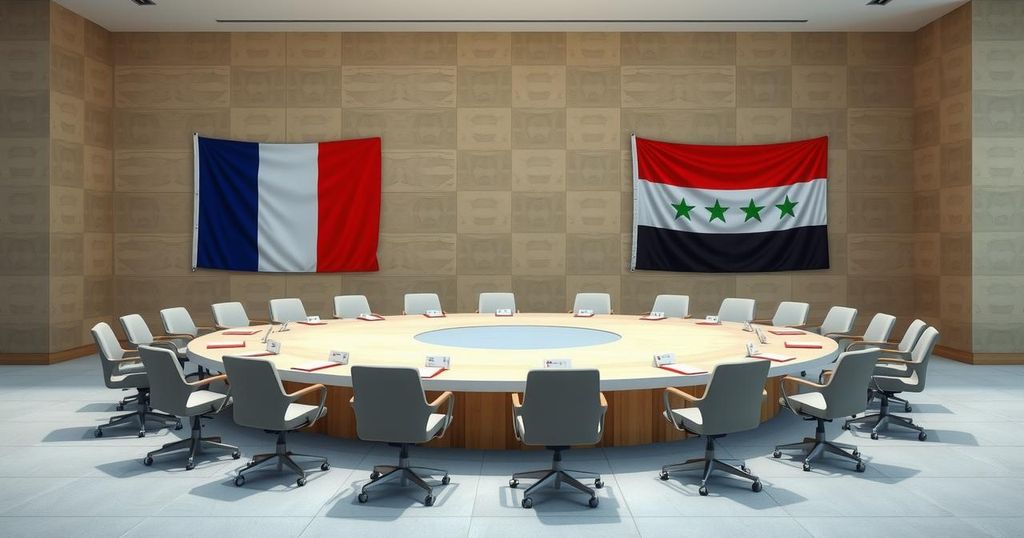Ahmad Al Shara to Meet Macron in Paris Amid Sectarian Violence in Syria

Ahmad Al Shara, Syrian opposition leader, will meet President Macron in Paris, marking his first trip to the West. The visit reflects France’s support towards a more inclusive Syrian governance model. Al Shara’s government pledges to respect diverse groups while facing escalating sectarian violence. Diplomatic discussions include reviving Syria’s economy and addressing sanctions hindering recovery efforts.
Ahmad Al Shara, a leader of the Syrian opposition, is set to meet with French President Emmanuel Macron in Paris this Wednesday. This marks Al Shara’s first trip to a Western nation, against a backdrop of worsening sectarian violence in Syria. According to a Macron advisor, Al Shara’s visit reflects France’s ongoing support for the Syrian populace amidst foreign expectations for a more inclusive governance model.
While Al Shara has previously been a rebel leader during Syria’s civil war, he remains under sanctions from the United Nations, which raised logistical issues for this visit. France had to request an exemption to host him. The advisor clarified the situation by stating, “He can go to Paris under the temporary exemption that was requested.” Following their meeting, both leaders will address the media in a joint press conference set for Tuesday evening.
Macron is expected to voice France’s commitment to aiding in the development of a “free, stable and sovereign Syria” that acknowledges the diverse segments of the Syrian society. As his office noted, “This meeting is part of France’s historic commitment to the Syrian people who aspire to peace and democracy.” Discussion topics will also include stabilizing the region and combating terror threats.
The invitation for Al Shara to visit France was extended in February, with a follow-up from Macron in March stipulating it would depend on forming an encompassing Syrian government that adequately represents various civil groups. Macron viewed his initial discussions with the new Syrian leadership as “positive”.
Al Shara, now leading a self-proclaimed government, has promised to cultivate a multi-confessional and multi-ethnic Syria where all religious and ethnic minorities can feel safe. Interestingly, France was quick to re-establish contacts with Syria, sending its Foreign Minister to Damascus shortly after the ousting of former president Bashar Al Assad at the end of last year. The French embassy in Syria was closed in 2012, but Paris is looking to reopen it soon.
Recent reports suggest that France is preparing to appoint Jean-Baptiste Faivre, an Arabic-speaking diplomat recently returned from Qatar, as its new charge d’affaires to Syria. On another note, last week, Syria entered into a three-decade partnership with French logistics company CMA CGM to develop facilities at Latakia port—an investment estimated at €230 million to revitalize Syria’s economy.
The rebuilding efforts in Syria are crucial and faces a towering cost of about $250 billion following 14 years of civil unrest. Widespread sanctions from the US and a partial revocation of certain European Union sanctions continue to hamper these recovery efforts. Discussions about these sanctions are anticipated during Al Shara’s Paris stopover, as noted by Macron’s advisor.
Despite Al Shara’s commitments to protect minority groups, Syria has been rocked by significant sectarian clashes recently. There have been over 1,700 casualties, feeding skepticism about whether the current leadership can effectively address extremist movements within its ranks. The conflict has invited international scrutiny, especially as Israel launched airstrikes in Syria, including near the Presidential Palace, emphasizing its role in protecting vulnerable communities, notably the Druze.
The Druze minority, numbering around 150,000 in Israel, have been heavily affected by the recent violence, strengthening Israel’s focus on maintaining ties with this group. Notably, Al Shara’s trip to France signifies broader efforts to rejuvenate Syria’s international relations and attract investment necessary for economic recovery.
Additionally, diplomatic overtures have included Syrian Foreign Minister Asaad Al Shibani’s recent meeting with US State Department officials in New York for the first time, and hints of financial assistance from Saudi Arabia and Qatar regarding Syria’s debts to the World Bank. Britain also lifted several sanctions against Syria last week, which indicates a gradual shift in the international outlook towards the country.
In summary, Ahmad Al Shara’s upcoming meeting with President Macron marks a pivotal moment for Syria’s new leadership as it seeks to engage with the West. France’s willingness to host Al Shara, despite UN sanctions, highlights its commitment to support the Syrian populace and push for a comprehensive government that includes diverse civil voices. As economic partnerships and international relations gradually heat up, the ongoing sectarian violence back home continues to cast a long shadow over the country’s hopes for stabilization and recovery.
Original Source: www.thenationalnews.com






